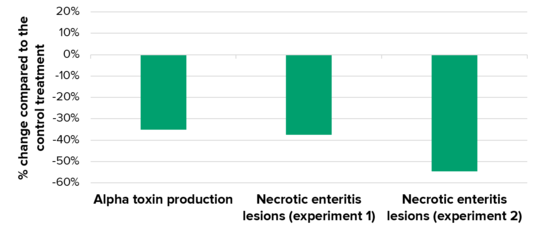Improving intestinal resilience with phytogenics, a promising way
The rising global human population and improving human welfare standards increase the demand for animal protein. It goes without saying that resilient animals play a crucial role in the challenge to meet this growing demand. And what would be more important in this context than an optimally developed and functional intestine? The intestine represents the ‘center of health’ in animals, too, and is a major prerequisite to fully exploit the animals' genetic potential, which in turn is the basis for an economic production of animal derived food. This article will give you exciting insights into the beneficial effects of phytogenic feed additives on the resilience of farm animals.

Several trials have shown that the inclusion of phytogenic feed additives (PFA) in feed enhances the performance of animals. Alongside improved performance, the gut resilience of animals will also be beneficially influenced. Since digestion of the feed is improved using phytogenic feed additives, fewer nutrients should be available for undesirable bacteria. This limits their population growth and the detrimental consequences typically associated with this uncontrolled growth.
Next to limiting undesirable bacteria population growth, phytogenics can also influence intestinal resilience via other strategies.

Quorum sensing interference
Quorum sensing (QS), or bacterial cell-to-cell communication, is a mechanism of gene regulation in which bacteria coordinate the expression of specific genes in response to the presence of small signaling molecules (inducers). This regulatory mechanism has been shown to control virulence gene expression in many different pathogens. Virulence factors include gene products involved, for example, in toxin production.
The abundance of signaling molecules in the environment directly reflects the bacterial population density. If a certain threshold of inducer concentration is reached, the bacteria start to produce virulence factors, leading to the disease outbreak in the host. Various pathogenic bacteria such as Clostridium perfringens have been shown to use QS to regulate their virulence and pathogenicity.

Selected phytogenic substances can interfere with the QS of bacteria and therefore possess the ability to suppress the virulence of bacteria. This so-called quorum sensing interference (QSI) can be studied very well in a model that Delacon developed. Studies showed that a mix of phytogenic substances could decrease 35% alpha toxin production of Clostridium perfringens. In two in vivo experiments, this mixture showed a 38 % decrease and a 55% decrease in necrotic enteritis lesions (Figure 1).
Stay tuned - next time there will be a follow-up to this article, dealing with the importance of a resilient intestinal integrity and – how could it be any different – the influence of PFAs.

Manu De Laet
Manu De Laet graduated in 2009 as a bio-engineer at the University of Leuven, Belgium. He has a master’s degree in animal production. After earning valuable experience with phytogenics, Manu started working for Delacon as Global Technical Manager Poultry in September 2018. He is now specialized in nutrition and the effect of phytogenics on digestibility.

Anja Keiner
After her scientific studies dealing with the effect of phytogenic substances on piglets’ health and performance at the Justus-Liebig university in Germany, Anja was eager to start her professional career with Delacon. Her experience in sales is an important backbone for the previous role as Product Manager Swine, but also for her current position as Global Technical Manager Swine and Poultry.










